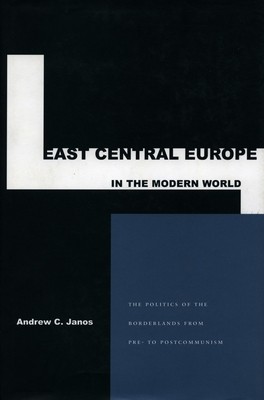
- We will send in 10–14 business days.
- Author: Andrew C Janos
- Publisher: Stanford University Press
- ISBN-10: 0804746885
- ISBN-13: 9780804746885
- Format: 15.9 x 23.6 x 3.1 cm, softcover
- Language: English
- SAVE -10% with code: EXTRA
Reviews
Description
Combining engaging narrative with analytic power, this book presents the past and present of East Central Europe in the larger context of the political and economic history of the Continent.
The central theme of the book is best summarized by the familiar French proverb that the more things change the more they are the same. For while the historical experience of East Central Europe in the modern world may be described as one of endemic political change--from Western liberalism to corrupted parliamentarism, from fascism to state socialism imposed by the Soviet Union, and now to a fledgling new liberalism under Western auspices--all these political systems faced the same stubborn facts of life: the region's economic backwardness vis-Ã -vis the West, the debilities of small nationhood, and the cultural divide between the lands of eastern and western Christianity.
In dealing with this volatile mix of continuity and change, this book provides a new interpretation of the politics of the region in the modern period. At the same time, it also contributes to the ongoing dialogue among disciplines by attempting to strike a better balance between cultural and economic explanations of conflict, between structural and institutional approaches to politics, and, above all, between intra- and extra-societal forces that shape power and politics in national states.
For the purposes of this book, East Central Europe is defined as the territory of the historical precursors, and contemporary successors, of the eight lesser member states of the former Soviet Bloc.
EXTRA 10 % discount with code: EXTRA
The promotion ends in 18d.19:35:33
The discount code is valid when purchasing from 10 €. Discounts do not stack.
- Author: Andrew C Janos
- Publisher: Stanford University Press
- ISBN-10: 0804746885
- ISBN-13: 9780804746885
- Format: 15.9 x 23.6 x 3.1 cm, softcover
- Language: English English
Combining engaging narrative with analytic power, this book presents the past and present of East Central Europe in the larger context of the political and economic history of the Continent.
The central theme of the book is best summarized by the familiar French proverb that the more things change the more they are the same. For while the historical experience of East Central Europe in the modern world may be described as one of endemic political change--from Western liberalism to corrupted parliamentarism, from fascism to state socialism imposed by the Soviet Union, and now to a fledgling new liberalism under Western auspices--all these political systems faced the same stubborn facts of life: the region's economic backwardness vis-Ã -vis the West, the debilities of small nationhood, and the cultural divide between the lands of eastern and western Christianity.
In dealing with this volatile mix of continuity and change, this book provides a new interpretation of the politics of the region in the modern period. At the same time, it also contributes to the ongoing dialogue among disciplines by attempting to strike a better balance between cultural and economic explanations of conflict, between structural and institutional approaches to politics, and, above all, between intra- and extra-societal forces that shape power and politics in national states.
For the purposes of this book, East Central Europe is defined as the territory of the historical precursors, and contemporary successors, of the eight lesser member states of the former Soviet Bloc.


Reviews